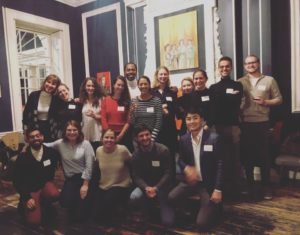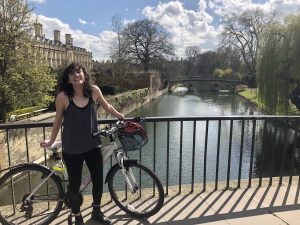Grad Schools Across the Pond
Contact
The Words: Macalester's English Student NewsletterSenior Newsletter Editors:
Birdie Keller '25
Daniel Graham '26
Callisto Martinez '26
Jizelle Villegas '26
Associate Newsletter Editors:
Ahlaam Abdulwali '25
Beja Puškášová '26
Sarah Tachau '27
Peyton Williamson '27
by Dalton Greene ’22
An English degree from Macalester can take graduates to any number of places, including, for some, to other countries entirely. I caught up with Mac English alumnae and former Words writers Zeena Fuleihan ’18 and Miriam Moore-Keish ’19, both of whom recently earned master’s degrees in England, via email to discuss their experiences.
Zeena Fuleihan ’18 completed an MA in Contemporary Literature, Culture, and Theory at King’s College London earlier this year and is now a PhD student in Literature at Duke University.

What was your journey to grad school like? When and how did you know you wanted to pursue graduate study, what drew you to postgraduate work in another country, and how did you choose your particular program?
I have always known that I wanted to pursue graduate education, but I spent a year working in publishing immediately after graduating first. While that came with its own interesting challenges, I consistently felt that I really missed being in an academic setting. I had also started writing monthly essays for the Ploughshares blog (read some of her essays here), which helped keep me connected to the critical thinking and writing headspace that I hoped to cultivate in graduate school, and was a fairly significant influence on my decision to move from the creative writing focus I’d had at Macalester to the more critical and theory-based scholarship of my current track. I knew I wanted to pursue a PhD, but due to the fact that committing to a five-to-six-year-plus program in a slightly different field than my undergraduate degree was fairly daunting, I looked into the one-year master’s programs in the UK, where I discovered a plethora of programs focused on contemporary literature and culture. The program at King’s College London ultimately won my vote because it was simply the most intriguing program I came across—it had the widest global purview and most unique course offerings I found, as well as fascinating faculty research.
How did your time at Macalester influence your education abroad? Are there any lessons you learned here that were especially valuable to you?
I know it can sound cliché, but Macalester really prepared me uniquely well for the huge amount of independent research and self-motivated inquiry of my graduate experience at King’s. Facing hundreds of pages of reading with very few class hours and no writing assignments besides one long paper at the end of each class, I started to emulate some of the things I had done in my Macalester classes to better engage with the material, such as writing short, one-to-two paragraph responses to my readings as Professor Daylanne English had us do in her classes—spending just a little time thinking on the page not only helped generate ideas and breakthroughs for class discussion and papers, but truly revolutionized my dissertation research process and made writing it so much smoother.
What were some of the rewards of living and studying in London? Were there any particular highlights of your experience?
The biggest highlight was definitely the incredible access to all sorts of speaking events, art, and theatre. A few favorite outings were a talk on feminist perspectives on Islamic sacred texts at the British Library, a staging of Valeria Luiselli’s Faces in the Crowd (which Coffee House Press, the publishing house I worked at, published the English translation of) at a tiny theatre in Notting Hill, and the annual queer panto at the Royal Vauxhall Tavern called “Slipped! Cinderella rebooted” which was likely the most clever production I’ve seen (and I’d be remiss not to mention that in this version of Cinderella, the prince has a shoe fetish!). I also got to see some of my favorite authors talk, such as Hanan al-Shaykh, Khaled Khalifa, and Kamila Shamsie, which would probably never have happened in such a short time span in any other city.
What advice would you give to current English majors or minors at Mac?
If you are interested in applying to graduate school abroad, I have two pieces of practical advice. First, look into scholarships well ahead of time—there are a lot of scholarships for international graduate education from US organizations but the application deadlines often come much earlier than those for the actual degree programs. Second, live in student housing! I didn’t, and attempting to set up utilities while also struggling to open a bank account in a new country was a nightmare. And, as my advice is and will always be for current students across the board, go to your professors’ office hours, even if they are currently virtual! This is the one thing I wish I had done more of when I was at Macalester.
Miriam Moore-Keish ‘19 spent the past year studying for an MPhil in Critical Approaches to Children’s Literature at Girton College, University of Cambridge. She shares information about grad school, postcolonial or African-American children’s literature, her research, or Cambridge.

What was your journey to grad school like? When and how did you know you wanted to pursue graduate study, what drew you to pursue this work in another country, and how did you choose your particular program?
From the middle of my sophomore year, when I decided to pursue children’s literature, I knew I wanted to go to grad school. Children’s literature scholarship is niche and pretty cutting edge, so I knew if I wanted to study children’s books and eventually go into publishing them, I would need to do so in an education setting after Mac. I can count the number of schools that offer master’s degrees in children’s lit on my fingers, and I think I applied to all of those programs. As much as I want to say going to the University of Cambridge was a dream of mine, I actually tossed in a last minute application kind of haphazardly. When all my applications got accepted, I ended up committing to Cambridge because it was (surprisingly) the most cost-efficient choice. The critical approaches to children’s literature (CACL) program at Cambridge also intrigued me because it was only one year and allowed me to execute autoethnographic study, empirical research in children’s reactions to children’s texts, and commit myself to a dissertation with the close supervisor/supervisee relationship that is really classic Cambridge.
How did your time at Macalester influence your education abroad? Are there any lessons you learned here that were especially valuable to you?
I did study abroad at King’s College London so I had a pretty good idea of what living in the UK was like. The most valuable lesson from my time at Mac was actually a series of lessons from Daylanne English’s African-American literature classes. I wrote my dissertation on constructions of Black maturity and innocence in American children’s literature from the 1890s to the 2010s (I think it’s kind of funny that I went all the way across the ocean to just write a dissertation on the literature of my country). I drew a lot of my baseline theoretical frameworks from texts and critical analyses that I encountered in Daylanne’s classes. I even quoted her in my conclusion, I’m pretty sure. Naturally, I brought some children’s lit-specific scholars into the conversation, but my initial interest in the subject matter absolutely arose from those courses at Mac.
What were some of the rewards of living and studying in Cambridge? Were there any particular highlights of your experience?
I loved Cambridge. It’s kind of hard to explain it to anyone without sounding like describing a fantasy novel or a cult. I say this with the deepest love. When I would call my friends from college to try to tell them how I was doing, saying something like, “oh, I had sherry with the headmistress in my matriculation gown and then went to Watson and Crick’s favorite pub with Boris Johnson’s son’s ex-girlfriend” isn’t the most relatable content. In all honesty, though, the best part of Cambridge was the whole culture. I’m glad it was only for one year because I didn’t have the chance to get fully bored of formal halls with all the students in gowns lined up at tables for dinner like Harry Potter, punting to Grantchester on the Cam, and being surrounded by the incredible history and resources Cambridge has to offer. I saw plays on London’s West End for lectures, presented at a Cambridge conference, and met Henry Winkler at a Society of Children’s Book Writers and Illustrators webinar and Michael Rosen at the 2020 Queering Children’s Literature Symposium. I took all of these opportunities with several grains of salt because the University is a huge hub of imperial knowledge, money, and power. Grains of salt aside, it was also an honor to make all the friends I did: friends from all around the world flocking to this institution to pursue knowledge and study in areas they love.
What advice would you give to current English majors or minors at Mac?
Get involved in the literary community outside of Mac. Don’t sacrifice your Macalester English involvement (submit to Chanter!), of course, but don’t limit yourself to it. Going to graduate school really illuminated the extent of literature-based organizations that are happy to work with students. I got a job with #WeNeedDiverseBooks (learn more about this organization here) after graduating from Macalester that I kept up throughout my time at Cambridge, which also fostered connections and positions with other children’s literature authors, editors, and scholars. I was under the impression throughout my undergrad that these kinds of professionals wouldn’t want to hear from me if I was still a student. I’ve since found that to be aggressively not the case. I was talking to Neil Strandberg ’88 (another Mac alum!) from Shelf Awareness this summer and he was saying the literary world is actually craving intervention and critique from young adults. Maybe current students are a little braver than I was, but if I could give one piece of advice, it is to do more. I thought completing one publishing internship would be all the world would want from me at my stage in life but the world wants and needs so much more.
Thank you to Zeena and Miriam for sharing some of their wisdom with us here at The Words!